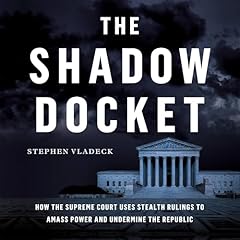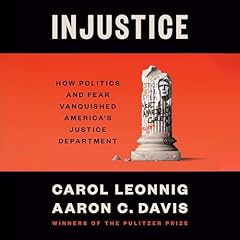
Until Justice Be Done
America's First Civil Rights Movement from the Revolution to Reconstruction
No se pudo agregar al carrito
Add to Cart failed.
Error al Agregar a Lista de Deseos.
Error al eliminar de la lista de deseos.
Error al añadir a tu biblioteca
Error al seguir el podcast
Error al dejar de seguir el podcast
 Exclusivo para miembros Prime: ¿Nuevo en Audible? Obtén 2 audiolibros gratis con tu prueba.
Exclusivo para miembros Prime: ¿Nuevo en Audible? Obtén 2 audiolibros gratis con tu prueba.Compra ahora por $22.81
-
Narrado por:
-
Allyson Johnson
-
De:
-
Kate Masur
A groundbreaking history of the movement for equal rights that courageously battled racist laws and institutions, North and South, in the decades before the Civil War.
The half-century before the Civil War was beset with conflict over equality as well as freedom. Beginning in 1803, many free states, claiming the authority to maintain the domestic peace, enacted laws that discouraged free African Americans from settling their boundaries and restricted the rights to testify in court, move freely from place to place, work, vote, and attend public school. But over time, African American activists and their white allies, often facing mob violence, courageously built a movement to fight these racist laws. They countered the states' insistence on local control with the equal-rights promises they found in the Declaration of Independence and the Constitution. Long stymied by hostile white majorities and unfavorable court decisions, the movement's vision became increasingly mainstream in the 1850s, particularly among supporters of the new Republican party. When Congress began rebuilding the nation after the Civil War, Republicans installed this vision of racial equality in the 1866 Civil Rights Act and the Fourteenth Amendment. These were the landmark achievements of the first civil rights movement.
©2021 Kate Masur (P)2021 KaloramaLos oyentes también disfrutaron:




















Las personas que vieron esto también vieron:







A ton of interesting and interrelated storylines that help add to the layers of issues that marked the times especially in the sense of questions of citizenship and status even of free Blacks of the time. I thought that Frederick Douglass Wasn’t given the space in the book what he deserved. While dealing with these issues of the fugitive slave act and the Dred Scott Supreme Court decision that lead to a few anecdotes of slaves leaving the country to Canada in particular, I thought it was a real omission not to talk about how Frederick Douglass fled to England for several years. It wasn’t until his freedom was purchased by an evolution of script that he returned.
I felt like the first inaugural address lacked Total context omitting Lincolns literal pleas to the southern states of which only seven states had seceded at the time Not to leave the union because of slavery. He made it clear that he had no intention of outline or getting rid of slavery in the states and where she was already established legally. In fact he also referred a detail to the Corwin Amendment which had recently passed in congress and was ready to Submitted to the states for ratification which would guarantee that Congress would not pass a law outlawing slavery.Ironically that would’ve been the 13th amendment had a past which would’ve been the exact opposite of the ultimate 13th amendment freed the slaves four years later.
She also spent no time talking about the preliminary emancipation proclamation which Lincoln previewed to Frederick Douglass in September 1862. It called not for freeing and integrating freed slaves into the society in general, but for sending them to colonies in South America. Douglas was outraged and wrote stories about this in oppositionAnd his Northstar. He did of course modify it before it was issued in January 1863.
In general, I feel like she let Lincoln off the hook, as well as many others in the north.
I would highly recommend anyone reading this book to also read Frederick Douglass third autobiography. You can skip the first two they’re incorporated almost verbatim in the third. It includes the story of the unveiling of the Lincoln statue in Washington that has been the subject of debate in the last couple of years. Many from the left wanted it removed because there’s a slave kneeling at his feet with broken chains. That statue was purchased entirely of money donated by three slaves as organized by Frederick Douglass. Previous attempts to raise the money for his failed. He delivered the speech on the 10th anniversary of Lincoln‘s assassination.He really lays out in plain detail much of his relationship with Lincoln which was not positive. He did however overall praise Lincoln very much for the role he played in the The actual emancipation that follow the war to replace the executive action which Shirley would’ve been declared unconstitutional.
In spite of these negative comments I’m very glad to read this book. Like much of Barbara Tuckman’s works It’s history through a fire hose interweaving many layers of a lot of stuff that was going on at the same time. That’s the only way you can understand these things. I think her for taking the time and effort to put this together for us. But find a new reader!
Learned a lot of details yet still disappointed
Se ha producido un error. Vuelve a intentarlo dentro de unos minutos.


